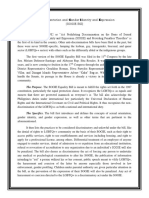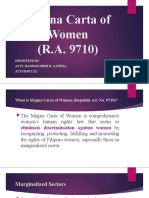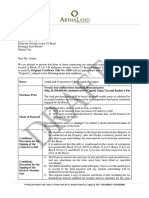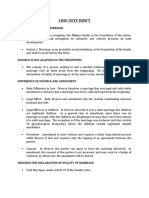0 ratings0% found this document useful (0 votes)
3K viewsSogie Bill
Sogie Bill
Uploaded by
anna sheillaThe document discusses the Sexual Orientation and Gender Identity Expression (SOGIE) bill, which aims to prohibit discrimination based on sexual orientation and gender identity in the Philippines. It provides definitions for key terms like sexual orientation, gender identity, and gender expression. The bill has been controversial and slow to pass due to opposition. If passed, it would make discriminatory acts like denying services, employment, or education illegal and subject to fines or imprisonment. Supporters argue it promotes equality, while opponents believe it could undermine religious freedom.
Copyright:
© All Rights Reserved
Available Formats
Download as DOCX, PDF, TXT or read online from Scribd
Sogie Bill
Sogie Bill
Uploaded by
anna sheilla0 ratings0% found this document useful (0 votes)
3K views6 pagesThe document discusses the Sexual Orientation and Gender Identity Expression (SOGIE) bill, which aims to prohibit discrimination based on sexual orientation and gender identity in the Philippines. It provides definitions for key terms like sexual orientation, gender identity, and gender expression. The bill has been controversial and slow to pass due to opposition. If passed, it would make discriminatory acts like denying services, employment, or education illegal and subject to fines or imprisonment. Supporters argue it promotes equality, while opponents believe it could undermine religious freedom.
Original Title
SOGIE BILL
Copyright
© © All Rights Reserved
Available Formats
DOCX, PDF, TXT or read online from Scribd
Share this document
Did you find this document useful?
Is this content inappropriate?
The document discusses the Sexual Orientation and Gender Identity Expression (SOGIE) bill, which aims to prohibit discrimination based on sexual orientation and gender identity in the Philippines. It provides definitions for key terms like sexual orientation, gender identity, and gender expression. The bill has been controversial and slow to pass due to opposition. If passed, it would make discriminatory acts like denying services, employment, or education illegal and subject to fines or imprisonment. Supporters argue it promotes equality, while opponents believe it could undermine religious freedom.
Copyright:
© All Rights Reserved
Available Formats
Download as DOCX, PDF, TXT or read online from Scribd
Download as docx, pdf, or txt
0 ratings0% found this document useful (0 votes)
3K views6 pagesSogie Bill
Sogie Bill
Uploaded by
anna sheillaThe document discusses the Sexual Orientation and Gender Identity Expression (SOGIE) bill, which aims to prohibit discrimination based on sexual orientation and gender identity in the Philippines. It provides definitions for key terms like sexual orientation, gender identity, and gender expression. The bill has been controversial and slow to pass due to opposition. If passed, it would make discriminatory acts like denying services, employment, or education illegal and subject to fines or imprisonment. Supporters argue it promotes equality, while opponents believe it could undermine religious freedom.
Copyright:
© All Rights Reserved
Available Formats
Download as DOCX, PDF, TXT or read online from Scribd
Download as docx, pdf, or txt
You are on page 1of 6
SOGIE BILL
Q: What is the meaning of SOGIE?
A: It is an acronym for Sexual Orientation and Gender Identity
Expression.
It is also known as the Equality Bill or Anti-Discrimination Bill.
Q: Let’s dissect SOGIE!
A:
1. Sexual Orientation- refers to who a person is sexually
attracted to.
FIVE subcategories in this section.
1. Asexual - This is a person who is not attracted to anyone
2. Straight - This is an individual who has a sexual attraction to
a person of the opposite gender.
3. Bisexual - It is a person who exhibits sexual attractions to
persons of the same gender, and those of the opposite gender.
4. Gay - A man attracted to a fellow man.
5. Lesbian - A woman attracted to a fellow woman.
2. Gender Identity, is how a person presents or feels about his
gender.
TWO categories:
2.1. Cisgender- is a case where an individual feels that
the gender assigned to him during birth is true to what
he is.
2.2. Transgender - People in this group have a feeling
that they do not belong to the gender assigned to
them at birth. They have a conviction that they belong
to the opposite gender.
3. Gender Expression is typically how an individual presents
him/herself. It could be in the way they dress, speak, or their
general life, among others.
Q: Why is this Bill controversial?
A: This was filed in Congress as early as the Year 2000,
sponsored by the former Senator Miriam Defensor Santiago,
and Akbayan Represetative Etta Rosales. It would pass Third
reading in Congress but can never get passed in the Senate. It
was refiled by other congressman and senator through the
years, but it was never approved.
Q: Status at the moment?
A: The Bill was finally passed in Congress in 2017. House Bill No.
4982 was approved for a third and final reading for the first time
since 2001 with 197 members of the House of
Representatives voting for the bill and none opposing it, a
historic pro-LGBT move from the House of Representatives.
Note: It was sponsored by:
Dinagat Islands Representative Kaka Bag-ao
Bataan Representative Geraldine Roman,
Akbayan Representative Tomas Villarin
Q: How about in the Senate?
A: The Senate version of the bill was first filed in August 11, 2016.
It was sponsored by Risa Hontiveros in December 14 of the
same year. The bill has become one of the slowest-moving bills
in the country's history. By May 2019, the SOGIE Bill officially
became the longest-running bill under the Senate interpellation
period in Philippine history.
Last December 16, 2020, in the 18th Congress, Risa
Hontiveros, refiled and sponsored the Sexual Orientation and
Gender Identity Expression and Sex
Characteristics (SOGIESC) Equality Bill at the Senate plenary.
It is now reiterated as Senate Bill No. 1934, or AN ACT
PROHIBITING DISCRIMINATION, MARGINALIZATION, AND
VIOLENCE COMMITTED ON THE BASIS OF SEXUAL
ORIENTATION, GENDER IDENTITY, GENDER EXPRESSION
AND SEX CHARACTERISTICS AND PROVIDING
SANCTIONS THEREFOR.
Q: How is Sex Characteristics (SC) defined under the latest
Senate Bill?
A: Refers to a person's physical traits that indicate their biological
sex, such as chromosomes, external genitalia, gonads,
hormones, and internal reproductive organs. Traits present at
birth are called primary sex characteristics, whereas those that
develop during puberty are called secondary sex
characteristics. A person's sex characteristics can be male,
female, or Intersex.
Q: What is the PURPOSE of the SOGIE BILL?
A: 1. To fulfill the equal protection clause under our 1987
Constitution, recognizing LGBTQ++ as equals and ensures that
their rights are protected inasmuch as everyone’s is.
2. To fulfill our country’s duties under international law
particularly the Universal Declaration of Human Rights and
the International Covenant on Civil and Political Rights. It
thus recognizes the non-discrimination of the LGBTQ++ as both
a national and international duty.
Q: In summary, what is the SOGIE bill?
A: The law draft identifies a particular set of actions which it
deems as discriminatory. Anyone, corporation, or organization
that violates them is liable to charges in the court.
Q: What are the ACTS considered to be DISCRIMINATORY
and unlawful under the Bill?
A:
1. Denial of rights to LGBTQ+ community on the basis of their
SOGIE, such as:
their right to access public services,
right to use establishments and services including
housing,
right to apply for a professional license, among others.
2. Differential treatment of an employee or anyone engaged to
render services;
3. Denial of admission to or expulsion from an educational
institution, refusal or revocation of accreditation to any
organization due to an individual’s SOGIE will also be
penalized.
4. Forcing any person to undertake any medical or
psychological examination to alter his SOGIE;
5. the publication of information intending to “out” a person
without his or her consent;
6. public speech meant to vilify LGBTQ+,
7. the harassment and coercion of any member of LGBTQ+ by
anyone especially those involved in law enforcement, and
gender profiling.
8. Children under parental authority are given particular
attention in the bill, as the prevention of the expression of
their SOGIE will also be penalized.
9. Any act of harassment or coercion directed to the LGBTQ+
is a discriminatory act under the SOGIE.
Q: What are the PENALTIES for commission of the above-
mentioned acts?
A: Fine -P100,000 to 500,000.00 or
Imprisonment of 1 to 6 years, OR BOTH!
Community service may also be imposed.
Note: Under the latest senate Bill, the fine is not less than
P500,000 but not more than P1,000,000.00.
Q: What are the other features of the SOGIE BILL?
A: it is not only punitive, but also PREVENTIVE.
It orders the inclusion of SOGIE concerns in all police
station activities and services, with the renaming of the
Women and Children’s Desks to Women, Children, and
LGBTQ++ Protection Desk, and the imposition of human
rights based training on the police.
It directs the promotion of nondiscrimination through
social protection and diversity programs, and even
incentivizes the positive portrayal of the LGBTQ++ in the
media.
A SOGIE Equality Oversight Committee shall be created
to effectively implement the Act.
Q: What are the advantages & disadvantages of the SOGIE
Bill?
A: Pros & Cons
Advantages:
1. It advocates for equality and fairness not only to the
LGBTQ members but also to every person in the
country;
2. It seeks to control the behavior and perception of
the general public towards others based on sexual
orientation.
3. The LGBTQ members will have access to hospital
services and other facilities without fear of
discrimination.
Disadvantages
1. The law could be used by the LGBTQ members to
threaten other people that may not agree to their
terms;
2. The draft seeks to undermine religious and
academic freedoms and principles;
3. Transgender will go beyond the bounds of standard
behavior and moral principle.
Other countries have certain laws that specifically prohibit
discrimination against sexual orientation and religion or belief, among
others.
In the United States, discrimination against certain employees and
applicants of a job is criminalized under Title VII of the Civil Rights
Act of 1964. The said law prohibits discrimination based on a
person’s race, color, religion, national origin, physical and mental
disability, reprisal and sexual orientation.
In Australia, it is prohibited to discriminate based on a person’s
gender, sexual orientation, marital or relationship status (including
same-sex couples), familial responsibilities and pregnancy under
the Sex Discrimination Act 1984.
The United Kingdom’s Equality Act 2010 protects people from
discrimination based on their age, disability, gender reassignment,
marriage and civil partnership, pregnancy and maternity, race,
religion and belief, sex and sexual orientation.
You might also like
- Squad Leader (Avalon Hill)Document32 pagesSquad Leader (Avalon Hill)silvannus92% (36)
- Laws On Succession in The PhilippinesDocument8 pagesLaws On Succession in The Philippinesanna sheilla100% (7)
- Sogie-Bill-Report-Group-2 2Document24 pagesSogie-Bill-Report-Group-2 2Quervy Mallari100% (7)
- Complaint Affidavit For Trespass To Dwelling SampleDocument2 pagesComplaint Affidavit For Trespass To Dwelling Sampleanna sheilla80% (5)
- Legal Basis For The Study of Gender and SocietyDocument61 pagesLegal Basis For The Study of Gender and SocietyBench Fuentes100% (4)
- Women and The Law - Gender and Society PresentationDocument28 pagesWomen and The Law - Gender and Society PresentationVillamor Picsiwen100% (3)
- Presentation Magna Carta of WomenDocument24 pagesPresentation Magna Carta of WomenSj Eclipse100% (3)
- Notice of RescissionDocument2 pagesNotice of Rescissionanna sheilla100% (1)
- Exclusive Agency AgreementDocument4 pagesExclusive Agency Agreementanna sheilla100% (2)
- POOngsan Ammo CatalogueDocument56 pagesPOOngsan Ammo CatalogueFrancesco100% (2)
- Ra 6725Document13 pagesRa 6725KaixiNo ratings yet
- Lesson 19: Laws and Policies On Violence and Discrimination of The Members of LGBTQ+Document16 pagesLesson 19: Laws and Policies On Violence and Discrimination of The Members of LGBTQ+RENE REY ALCODIA100% (1)
- Gender Based ViolenceDocument34 pagesGender Based Violencemarlon anzano75% (4)
- Ra 11313 Safe Spaces Act, S. 2018Document5 pagesRa 11313 Safe Spaces Act, S. 2018Richard Balais100% (1)
- Gender and SocializationDocument29 pagesGender and SocializationZhack Magus100% (1)
- Gender and Sexuality As A Social Reality: What To Expect?Document6 pagesGender and Sexuality As A Social Reality: What To Expect?SUHARTO JERICHO ANDALNo ratings yet
- Speech of RacismDocument1 pageSpeech of RacismFleeChen07100% (2)
- PCGG v. DumayasDocument3 pagesPCGG v. DumayasJates OinezaNo ratings yet
- OCD Video AnalysisDocument5 pagesOCD Video AnalysisBrittney rockwellNo ratings yet
- Discrimination On The Basis of Sexual Orientation, Gender Identity and Expression (Sogie) in The PhilippinesDocument11 pagesDiscrimination On The Basis of Sexual Orientation, Gender Identity and Expression (Sogie) in The PhilippinesRENE REY ALCODIANo ratings yet
- Sogie BillDocument13 pagesSogie BillClarisse-joan GarmaNo ratings yet
- Sogie BillDocument3 pagesSogie BillGrevicJumawanNo ratings yet
- List of Laws Protecting Women in PHDocument7 pagesList of Laws Protecting Women in PHMaryRoseRiveraNo ratings yet
- SOGIE Equality BillDocument3 pagesSOGIE Equality BillDaniel EstoyNo ratings yet
- Explanation Ra 7877Document4 pagesExplanation Ra 7877KateBarrionEspinosa83% (6)
- Laws Supporting Sexuality and GenderDocument18 pagesLaws Supporting Sexuality and GenderGlenus100% (1)
- Gender-Based Violence: Power, Use of Force, and Consent: Lesson 16Document14 pagesGender-Based Violence: Power, Use of Force, and Consent: Lesson 16RENE REY ALCODIANo ratings yet
- Republic Act No. 7610Document19 pagesRepublic Act No. 7610Nur SanaaniNo ratings yet
- Laws, Policies & Programs For Philippine WomenDocument38 pagesLaws, Policies & Programs For Philippine WomenAngel Marie Rule100% (1)
- 05b6-1714:documents (1) /gender Development (Reflection)Document3 pages05b6-1714:documents (1) /gender Development (Reflection)Queenie Carale0% (1)
- Gender Based Violence - Power, Use of Force, and Consent ModuleDocument3 pagesGender Based Violence - Power, Use of Force, and Consent ModulegabriellejoshuaramosNo ratings yet
- R.A. 11313 - Safe Spaces ActDocument5 pagesR.A. 11313 - Safe Spaces ActGelo MVNo ratings yet
- Lesson 17:: Women and The LawDocument17 pagesLesson 17:: Women and The LawAnna Rose T. MarcelinoNo ratings yet
- Laws Supporting Sexuality and GenderDocument7 pagesLaws Supporting Sexuality and GenderJohn Lloyd PedritaNo ratings yet
- Law ReviewDocument13 pagesLaw ReviewMaricar BautistaNo ratings yet
- Gender and Society - Module 6Document12 pagesGender and Society - Module 6TERRIUS Ace100% (1)
- Republic Act 7877Document4 pagesRepublic Act 7877RhemjoshRamosVenturaAndradaNo ratings yet
- LESSON 12 Stereotype Prejudice and DiscriminationDocument4 pagesLESSON 12 Stereotype Prejudice and DiscriminationGwyneth Mailed100% (1)
- Take Home Exam - PolgovDocument2 pagesTake Home Exam - PolgovRon Lucernas Mayuga100% (3)
- Anti-Vawc RA 9262: Prepared byDocument15 pagesAnti-Vawc RA 9262: Prepared byBong ClaudioNo ratings yet
- Sogie BillDocument3 pagesSogie BillJona MagudsNo ratings yet
- Reflection in Ra 9262Document2 pagesReflection in Ra 9262ere chanNo ratings yet
- Jennifer Laude CaseDocument2 pagesJennifer Laude CaseDONNIE RAY SOLONNo ratings yet
- Laws and Policies On Violence and Discrimination Against The LGBTQ+Document15 pagesLaws and Policies On Violence and Discrimination Against The LGBTQ+Merian MaravilesNo ratings yet
- Magna Carta of Women (R.A. 9710) : Presented By: Atty. Hannah Irish R. Cañeda Attorney IiiDocument43 pagesMagna Carta of Women (R.A. 9710) : Presented By: Atty. Hannah Irish R. Cañeda Attorney IiiTitser Yasi100% (1)
- Ge 11 Gender and Society Module 1Document3 pagesGe 11 Gender and Society Module 1Jaelai Ann BenitezNo ratings yet
- Gender and Society Module 1Document40 pagesGender and Society Module 1Glorime Ortega Junio100% (2)
- RA 7192 - Women in Development and Nation Building ActDocument9 pagesRA 7192 - Women in Development and Nation Building ActRosa Gamaro100% (3)
- Republic Act 7192:: Women N Development and Nation Building ActDocument12 pagesRepublic Act 7192:: Women N Development and Nation Building ActAngge75% (4)
- RA 11313 Safe Spaces ActDocument6 pagesRA 11313 Safe Spaces ActMaddison Yu100% (1)
- Gender and Society - Module 5Document8 pagesGender and Society - Module 5TERRIUS AceNo ratings yet
- Discrimination On The Basis of Sogie in The PhilippinesDocument10 pagesDiscrimination On The Basis of Sogie in The PhilippinesMerry Japs Pelosas100% (2)
- Republic Act 7688Document2 pagesRepublic Act 7688acinad_eiram10168537No ratings yet
- Lecture On Gender-Fair LanguageDocument8 pagesLecture On Gender-Fair LanguageAiron Bendaña0% (1)
- PGC Article 3 Sec 11 - 16 Research ReportDocument38 pagesPGC Article 3 Sec 11 - 16 Research ReportA100% (1)
- Gender-Based Violence Survivor, Victim, Perpetrator, and Human RightsDocument25 pagesGender-Based Violence Survivor, Victim, Perpetrator, and Human Rightstempo100% (2)
- Review of Related Literature SsDocument3 pagesReview of Related Literature SsShar LaNo ratings yet
- Reflection Essay - BIOCODocument1 pageReflection Essay - BIOCOAlthea Joy Sincero BiocoNo ratings yet
- Chaprter 4 ContemDocument2 pagesChaprter 4 ContemRuby ArcigaNo ratings yet
- Marginalized Sector in The PhilippinesDocument7 pagesMarginalized Sector in The PhilippinesLö Räine AñascoNo ratings yet
- The Anti-Sexual Harassment Act of 1995Document31 pagesThe Anti-Sexual Harassment Act of 1995Princess Cue Aragon100% (1)
- Activity HRM HistoricalDocument1 pageActivity HRM HistoricalRicky LavillaNo ratings yet
- (Aka Bawal Bastos Law or Anti-Bastos Law) With The Aim of Ensuring The EqualityDocument7 pages(Aka Bawal Bastos Law or Anti-Bastos Law) With The Aim of Ensuring The EqualityGlenn Aquino100% (1)
- Discriminatio N & Inequalities: Group 3Document62 pagesDiscriminatio N & Inequalities: Group 3Mendez, Angel C.100% (1)
- Sogie ResearchDocument104 pagesSogie ResearchResa OctavoNo ratings yet
- Reviewer: Gender-Based Violence: Survivor, Victim, Perpetrator and Human RightsDocument30 pagesReviewer: Gender-Based Violence: Survivor, Victim, Perpetrator and Human RightskimprinceGANo ratings yet
- I Introduction To Gender and SocietyDocument16 pagesI Introduction To Gender and SocietyBianca MatienzoNo ratings yet
- Anti-VAWC Seminar Discussion PaperDocument9 pagesAnti-VAWC Seminar Discussion PaperDaryl Dumayas100% (2)
- Group 5 - SOGIE BillDocument37 pagesGroup 5 - SOGIE BillHannah Marie CaringalNo ratings yet
- Cross ExaminationDocument4 pagesCross Examinationanna sheillaNo ratings yet
- Comelec Resolution 10717Document6 pagesComelec Resolution 10717anna sheillaNo ratings yet
- Due ProcessDocument4 pagesDue Processanna sheillaNo ratings yet
- Agreement To Sell & Purchase DraftDocument9 pagesAgreement To Sell & Purchase Draftanna sheillaNo ratings yet
- MOA With Atty. Gerardo CruzDocument2 pagesMOA With Atty. Gerardo Cruzanna sheillaNo ratings yet
- Board Resolution SampleDocument2 pagesBoard Resolution Sampleanna sheillaNo ratings yet
- Authority To SellDocument2 pagesAuthority To Sellanna sheillaNo ratings yet
- Authority To Find Buyer (S)Document1 pageAuthority To Find Buyer (S)anna sheillaNo ratings yet
- 7F Arthaland Century Pacific Tower, 5 Avenue Corner 30 ST., Bonifacio Global City, Taguig City 1634 T (632) 4036910 F (632) 4036908Document2 pages7F Arthaland Century Pacific Tower, 5 Avenue Corner 30 ST., Bonifacio Global City, Taguig City 1634 T (632) 4036910 F (632) 4036908anna sheillaNo ratings yet
- Extrajudicial Settlement SampleDocument3 pagesExtrajudicial Settlement Sampleanna sheilla100% (2)
- Undertaking To Pay Commitment and Attorney's FeeDocument2 pagesUndertaking To Pay Commitment and Attorney's Feeanna sheillaNo ratings yet
- Labelling-Libel Revised Script 3Document7 pagesLabelling-Libel Revised Script 3anna sheillaNo ratings yet
- ANNULMENT Laws in The PhilsDocument4 pagesANNULMENT Laws in The Philsanna sheillaNo ratings yet
- Passive VoiceDocument3 pagesPassive VoicesuliNo ratings yet
- Structure: Federation of Association Football) Is The InternationalDocument2 pagesStructure: Federation of Association Football) Is The InternationalcoolapshNo ratings yet
- IRM 8 BlackmailDocument2 pagesIRM 8 BlackmailtaekNo ratings yet
- Rules The British Royal Family Has To Follow: When The Queen Is Done Eating, So Are YouDocument2 pagesRules The British Royal Family Has To Follow: When The Queen Is Done Eating, So Are YouLaura M.No ratings yet
- Updated Time Table 2023 Asian Classic Powerlifting ChampionshipsDocument1 pageUpdated Time Table 2023 Asian Classic Powerlifting Championshipsaniketsingh5375No ratings yet
- Liberation of Zojila Drass and Kargil in 1947-48-Operation DuckDocument4 pagesLiberation of Zojila Drass and Kargil in 1947-48-Operation DuckRamesh Lalwani100% (1)
- The Singareni Collieries Company Limited - Part 3Document17 pagesThe Singareni Collieries Company Limited - Part 3Raghu NarayanaraopetaNo ratings yet
- The Fourteenth Vision of DanielDocument4 pagesThe Fourteenth Vision of Danielkamion0No ratings yet
- Airpower Ii: Airpower Thought and Application Since Vietnam: Syllabus AY22Document42 pagesAirpower Ii: Airpower Thought and Application Since Vietnam: Syllabus AY22Wahyu EndriawanNo ratings yet
- SINNERS Analysis ActivitiesDocument5 pagesSINNERS Analysis Activitiesashwikareddy.19No ratings yet
- We're Not Afraid-1Document3 pagesWe're Not Afraid-1ajgamerrobloxNo ratings yet
- Ethical Standard: Lea3 Graded RecitationDocument3 pagesEthical Standard: Lea3 Graded RecitationKendall Jenner100% (1)
- HereWeGo3 Rev2Document1 pageHereWeGo3 Rev2vasiliki_mnNo ratings yet
- Detailed Lesson Plan in Philippine LiteratDocument9 pagesDetailed Lesson Plan in Philippine LiteratKyla Alyssa Lei MarianoNo ratings yet
- Necesariok. - Fissures of Popular CultureDocument5 pagesNecesariok. - Fissures of Popular CultureKAYE B. NECESARIONo ratings yet
- The Nephandi Text, by DJ BabbDocument39 pagesThe Nephandi Text, by DJ Babbsupreme_bangirasNo ratings yet
- PGCPS - Turner Complaint Filed May 11 2011Document9 pagesPGCPS - Turner Complaint Filed May 11 2011Thalia SandersNo ratings yet
- 1 - Laurel Park RetrospectosDocument10 pages1 - Laurel Park RetrospectosCruz Rafael Tiapa TovarNo ratings yet
- Contract Vitiating Factors Slides 1 PDFDocument173 pagesContract Vitiating Factors Slides 1 PDFvincent chimbaNo ratings yet
- ILLUMINAJI The Cult That Hijacked The WoDocument260 pagesILLUMINAJI The Cult That Hijacked The WoElin Irhamna100% (3)
- Macbeth PPT 1Document31 pagesMacbeth PPT 1ritiksirmorNo ratings yet
- Notice: Railroad Operation, Acquisition, Construction, Etc.: Suffolk & Southern Rail Road LLCDocument1 pageNotice: Railroad Operation, Acquisition, Construction, Etc.: Suffolk & Southern Rail Road LLCJustia.comNo ratings yet
- Percy Rutton Kavasmaneck (DR.) v. Gharda Chemicals LTD., 2008 SCC OnLine Bom 1245Document32 pagesPercy Rutton Kavasmaneck (DR.) v. Gharda Chemicals LTD., 2008 SCC OnLine Bom 1245SanjanaNo ratings yet
- Ang Tala Vol4 No1 Mar 2015Document40 pagesAng Tala Vol4 No1 Mar 2015MarlonMagtiraNo ratings yet
- Margarita Sanchez-Perez, A087 148 850 (BIA May 9, 2012)Document4 pagesMargarita Sanchez-Perez, A087 148 850 (BIA May 9, 2012)Immigrant & Refugee Appellate Center, LLCNo ratings yet










































































































